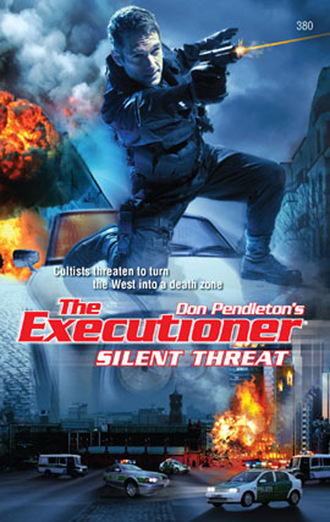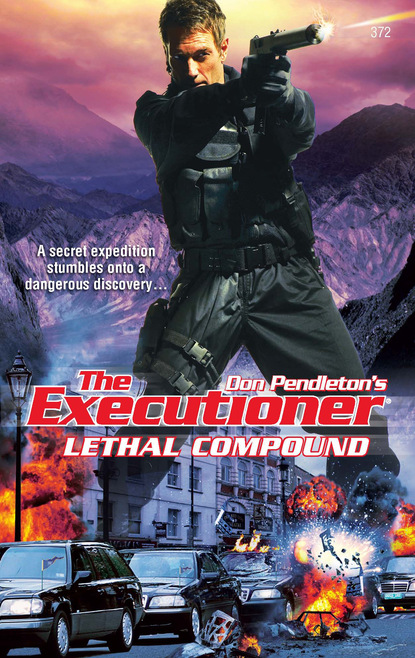
Полная версия
Silent Threat

Bolan shook his head
He’d seen plenty of fanatics willing to die for their cause. Call it a gut instinct, but these two women didn’t seem to be the type to take their lives for an abstract slogan. In Bolan’s experience, this type of brutal self-sacrifice was committed for a dynamic personality.
This force, this entity, this malevolent being stood at the center of the maelstrom of violence threatening to storm across Germany.
Just who could inspire this kind of bloodshed?
The Executioner ®
Silent Threat
Don Pendleton’s

The less reasonable a cult is, the more men seek to establish it by force.
—Jean-Jacques Rousseau
1712–1778
The true fanatic can be mesmerized by a charismatic leader, forced to harm or to kill in the name of the cause. My cause is Justice, and I’ll mete out my brand of judgment to those killers with extreme prejudice.
—Mack Bolan
THE MACK BOLAN LEGEND
Nothing less than a war could have fashioned the destiny of the man called Mack Bolan. Bolan earned the Executioner title in the jungle hell of Vietnam.
But this soldier also wore another name—Sergeant Mercy. He was so tagged because of the compassion he showed to wounded comrades-in-arms and Vietnamese civilians.
Mack Bolan’s second tour of duty ended prematurely when he was given emergency leave to return home and bury his family, victims of the Mob. Then he declared a one-man war against the Mafia.
He confronted the Families head-on from coast to coast, and soon a hope of victory began to appear. But Bolan had broken society’s every rule. That same society started gunning for this elusive warrior—to no avail.
So Bolan was offered amnesty to work within the system against terrorism. This time, as an employee of Uncle Sam, Bolan became Colonel John Phoenix. With a command center at Stony Man Farm in Virginia, he and his new allies—Able Team and Phoenix Force—waged relentless war on a new adversary: the KGB.
But when his one true love, April Rose, died at the hands of the Soviet terror machine, Bolan severed all ties with Establishment authority.
Now, after a lengthy lone-wolf struggle and much soul-searching, the Executioner has agreed to enter an “arm’s-length” alliance with his government once more, reserving the right to pursue personal missions in his Everlasting War.
Contents
Chapter 1
Chapter 2
Chapter 3
Chapter 4
Chapter 5
Chapter 6
Chapter 7
Chapter 8
Chapter 9
Chapter 10
Chapter 11
Chapter 12
Chapter 13
Chapter 14
Chapter 15
Chapter 16
Chapter 17
Chapter 18
Chapter 19
1
The wet streets of Berlin reflected the headlights of passing cars and the multicolored glow of countless shop signs. The clouds covering the leaden skies appeared to give no ground to the approaching twilight, but as the rain grew colder, the coming darkness closed over the busy streets like a clenching fist. Heedless of the rain, dressed in a brown trench coat and matching snap-brim hat, a man crossed the street in front of a popular coffee shop. He was one figure among many, but his presence caught the eye of one of the shop’s customers, who had taken a table near one corner. The table offered a good view of the large picture windows in front.
The man in the trench coat paused to remove his hat and run his fingers through his hair. His coat was open, and the watcher sitting in the corner noted the butt of the revolver just barely visible in the newcomer’s waistband.
“You are not difficult to spot,” said the man in the trench coat, moving to sit at the corner table without invitation.
“You’re fairly conspicuous yourself,” said Mack Bolan, aka the Executioner. “What’s with the third-rate spy novel getup?”
The man in the trench coat knew Mack Bolan as Matt Cooper, and for all his faults was probably well aware that the name was an alias. “I don’t see any reason to be insulted, Cooper,” he said.
Bolan gave him a hard look. “You don’t have something more important on your mind, Rieck?”
Adam Rieck, Bolan’s Interpol liaison, grimaced. “A fair point,” he said. He produced a folded sheaf of papers from inside his coat. “This is it.”
Bolan took the papers, glanced around and began shuffling through them under the edge of the table. There were laser-printed color photographs, a complete itinerary and some computer-generated maps indicating where the itinerary stops correlated physically. Bolan nodded.
“This will be plenty,” he said.
“Then I guess we’d better get going.” Rieck nodded in turn.
Bolan eyed him again. “Taking you along wasn’t part of the deal.” Of course, he’d known that it very well could be, and Hal Brognola, director of the Sensitive Operations Group, whose base of operations was at Stony Man Farm, Virginia, had said as much in describing the operation.
“Germany is in trouble,” the big Fed had said, speaking to Bolan from Washington using a secure, scrambled satellite phone.
“The whole country?” Bolan had asked.
“On certain levels,” Brognola said. “You’re aware of the push for greater security, greater governing controls on strategic industries worldwide.”
“Sure,” Bolan replied.
“The German government recently initiated a series of protocols intended to protect strategic industries from being bought out by what they call ‘locusts’—potentially hostile foreign investors, ‘undesirable’ hedge funds, and so on. In today’s political and war-fighting landscape, this is no surprise. Aaron and his team regularly monitor this type of activity.”
“I follow you,” Bolan said, knowing that Brognola referred to Aaron “the Bear” Kurtzman, head of the Farm’s team of computer wizards.
“While following up on the proposed controls and investigating some of the investment funds flagged as ‘undesirable’ foreign interests, Bear and his people found a subtle pattern. They tracked it and produced a very disturbing picture, something that only becomes apparent when you look at investments in strategic industries a few steps removed. Holding companies controlling holding companies influencing local German investors, in other words, but ultimately all linked to a central source.”
“Someone is buying into strategic industries in Germany. Someone with less than patriotic intentions.”
“Yes,” Brognola confirmed. “Specifically, a business entity calling itself Sicherheit Vereinigung, the Security Consortium. On its face, there’s no reason a company wouldn’t try to consolidate domestic industries when permitted, to secure a vertical hold on the market. But when that company does so but tries to conceal what it’s doing, it begs the question…why?”
“The Security Consortium. Sounds bland.”
“It’s meant to,” Brognola said. “They even have a Web site, Bear tells me. It’s completely harmless at first and second glance—just another among a seemingly endless list of financial services and investment companies. This one is headquartered in Germany, but Bear and his people have uncovered several backdoor ties to international interests. Those including rogue nations like Syria and Iran, countries that definitely do not have the interests of the Western industrialized world at heart.”
“There has to be more.”
“There is,” Brognola said. “Purchases of major German interests have gone mysteriously well for the Consortium. You might say they have miraculous corporate luck. If a local politician or businessman stands in the way of an acquisition, he either changes his mind quickly or has a perfectly explainable accident. No less than a dozen deaths, all officially classed as natural causes or freak misadventures, have been linked to chains of events that all ended in successful acquisitions by the Consortium.”
“So you think they’re muscling their way in, quietly.”
“And insidiously,” Brognola said. “More problematically, we theorize they have access to a potentially huge pool of foot soldiers, a dangerous group of people who are unpredictable. It’s a group called Eisen-Donner, or ‘Iron Thunder.’”
“Never heard of it,” Bolan admitted. “Is it a gang?”
“It’s a German cult, actually,” Brognola said, “and an underground one. The government is less tolerant than some others when it comes to these modern religious groups. You recall the uproar over there regarding that Hollywood actor and his religious ties, the one who wanted to film the World War II movie on site there.”
“Vaguely,” Bolan said wryly. “I don’t have a lot of time to read the entertainment news.”
“Iron Thunder is, from all we can uncover, a high-tech death cult. Their adherents use file-sharing technology to stay in touch and spread their nihilist, hedonist, death-to-the-world, free-yourself-from-earthly-pain message. They’ve grown remarkably in just the last two years, leveraging the popularity of worldwide video clip and social networking sites. Their leader, the Jim Jones to this happy little Internet Jonestown, is a man named Helmut Schribner. Schribner calls himself Dumar Eon.”
“Anything on him?”
“Not really,” Brognola said. “A few minor investigations for cybercrimes, bank fraud, that kind of thing. Nothing that stuck. One abortive investigation into production of pornography, a local obscenity rap that escalated because he was transmitting the material on the Web. No convictions. Schribner, or ‘Eon,’ is smart, technically savvy and very charismatic. He’s the Pied Piper here. If the online posts are any indication, his followers are devoted, and dangerously so.”
“That sort of thing usually leads to worse, sooner or later,” Bolan said. “Like the skinhead in California who attacked that interracial couple. The group he said gave him the idea got sued into bankruptcy. This cult see anything like that?”
“Nothing criminal,” Brognola said. “They’ve skirted the other side of the law a few times, officially, and been the target of at least one lawsuit in the United States because a high-school kid committed suicide after watching a bunch of their video clips. On the whole, though, nothing is traceable to them that would prompt more serious legal intervention.”
“How are they tied to the Consortium?” Bolan asked.
“One of the recent ‘accidents’ befell a man named Hermann Gruebner, owner and CEO of something called Arbeit Technopolitik. It’s a small company that makes printed circuit cards that eventually find their way into military equipment. Gruebner was supposedly mugged and strangled by a drug addict while jogging early one morning. Happened a couple of months ago. His mugger was stabbed in prison after a fast-track trial and conviction. The company, of course, was sold in the wake of his tragic death. We’ve traced the new owners to the Consortium.”
“Tidy,” Bolan said.
“Too tidy,” Brognola agreed. “Bear’s team ran a background check on the mugger, including known aliases off- and online, and they got a bunch of hits for videos uploaded to a popular video sharing and social networking site. All of them were Iron Thunder clips—proselytizing for the cult.”
“So a member of a German underground techno-death-cult murdered this CEO for reasons unknown, and took those reasons to an early grave at the end of a shank.”
“Exactly,” Brognola said. “Once we had that, and knew what to look for, we were able to turn up several more hits, some solid, some tenuous. Many of the accidents can be linked to persons with ties to Iron Thunder. It looks as if the Consortium is using the cult as street muscle to do the dirty work, clear the way for these strategic takeovers where necessary. Some purchases go down completely aboveboard. Some are problematic, and any obstacles are mysteriously and quickly removed, permanently. We figure they’re using a tried-and-true combination of bribery, influence peddling, intimidation and outright murder when needed.”
“And so the Consortium gobbles up business after business.”
“Yes,” Brognola said. “And that’s the problem. All the while it’s doing so, it’s trying to hide what’s going on. And that tells me, and the Man, that the Consortium is making a play for control of Germany’s strategic industries. Whether for pure profit, selling war matériel to the highest bidder, or out of some agenda to help hostile nations, we don’t know. The outcome is more or less the same. Whether terrorists or rogue nations that sponsor terrorists, Germany’s industries form key links in the global technology chain. If Germany falls behind the scenes, it puts the United States and the rest of the Western world in peril.”
“Why me, then, Hal?” Bolan asked. “What is SOG’s interest in this? Sounds like a job for more…mainstream government agencies.”
“It would be,” Brognola said, “if we had anything that the international law enforcement community would consider solid proof. We’ve got leads, correlations and damning circumstantial evidence, all of it turned up through mostly extralegal computer searches and traces run by Bear and his team. None of it is enough to convince the powers that be that official action is necessary.”
“What about the German government?” Bolan asked.
“As far as it’s concerned,” Brognola said, “this isn’t happening. The Consortium is a good domestic company and therefore trustworthy, officially. Whether the Germans are blind to what’s going on or just trying to cover their collective backsides, we don’t know. But they’re not happy that we’ve even raised the question. I spent several hours on the phone through channels, pulling strings and busting heads. They don’t like it, but they’ve reluctantly agreed to allow what is officially being considered an Interpol investigation.”
“Interpol?” Bolan asked.
“It gets us in the door,” Brognola said. “It doesn’t matter who they think we are, as long as you can get in and get it done. Basically, the Man wants you to go in and fix this problem. If you can get proof and we can secure further international cooperation, or direct cooperation with the Germans, that’s fine. If you can’t, you can still do what you do, burn them out and down, and put an end to this threat. Those are the President’s instructions.”
“Why not simply go to the source, then? We eliminate the Consortium and its heads. Problem solved, except for some mop-up of the cult.”
“Won’t work,” Brognola said. “The Consortium closely guards its membership rolls. We don’t know who they are, though we suspect in many cases. There are maybe three or four executives we could put you on, but that won’t begin to solve the problem. You need to find out who you’re dealing with, on the ground, by following the slime trails back to their source.”
“I’m a soldier, not a detective, Hal.”
“I’m not asking you to detect,” Brognola said. “I’m asking you to perform reconnaissance, then search and destroy.”
“Understood.”
“Let the Germans and Interpol think you’re who we tell them, unless and until you identify your targets. Then work around to the enemy, regardless.”
“Just how hostile will the locals be to my presence?”
“Officially, we’re letting them believe you’re one of the blacker sheep within the CIA,” Brognola said. “You’ll get nominal support and lip service, but don’t expect open arms.”
“Business as usual, then,” Bolan said.
“Yes,” the big Fed went on. “It doesn’t end there. In order to get local cooperation we’ve agreed to let Interpol assign us a contact. The Man himself secured their consent to work with us on this. They’ve been made aware of the broad strokes, or at least a sanitized version of them, though they have no idea who is behind this in truth.”
“Of course,” Bolan said.
“Stand by,” Brognola told him. “I’m transmitting you the contact’s dossier now. He’s relatively green, but nevertheless attached to one of the more shadowy branches of the Agency and its German equivalent. Born to German and American parents, educated here in the States. Did a few years abroad and in the Army, all of it post–iron curtain.”
“Can we trust him?”
“As far as we can trust anybody,” Brognola said. “Interpol thinks it’s taking the lead on this issue now, and we’re happy to let it. It allows us to operate under its umbrella, since we don’t officially exist. Your contact may even produce some worthwhile leads, or relay what Interpol manages to produce between now and when you hit ground in Germany.”
“All right, then,” Bolan had agreed. “I guess I’d better get going.”
“I guess you better,” Brognola had replied. “Good hunting, Striker.”
“Right.” Bolan had closed the connection.
Now, hours later, Bolan and Rieck sat facing each other over the dossier Interpol had managed to put together, and which Rieck had turned over. Bolan nodded, finally, jerking his chin toward the photographs and looking at Rieck. To his credit, the man understood without being told that Bolan wanted a synopsis.
“That,” Rieck said, indicating a photograph, “is Hans Becker, the president of Becker Aerospace. BA produces key missile guidance systems. It’s considered a prime ‘get’ in strategic industrial circles, and in the last several months it’s been having financial problems. An accidental warehouse fire here, a few key developers lost to a car accident there. Word is it’s ripe for buyout, but Becker, who owns the controlling interest, is resisting. It’s a family-owned company and always has been.”
“A prime target, in other words,” Bolan nodded. Watching the doorway from his seat, he saw a trio of young people, possibly students, wearing disposable plastic ponchos. Two of them had backpacks slung over one shoulder.
“Yes,” Rieck said. “Our analysts predict that BA is the most probable object of the Consortium’s interests. It’s financially vulnerable, it produces a strategically critical line of components, and Becker has reported some harassment to the local authorities.”
“Harassment?”
“Being followed, some late-night hang-up calls, and a few incidents of vandalism at his home here in Berlin,” Rieck said, pulling a hard copy of a digital photograph from the stack. The building it depicted appeared to be an apartment or condominium high-rise, its architecture a blend of old-world charm and modern efficiency. It looked pricey, if Bolan was any judge. It was, in other words, just the sort of place a president or CEO would call home in this German city.
“And BA itself?” Bolan asked. The students he had noticed before, a young man and two women, were settling at a table by the corner. One woman was blond, the other brunette. The blonde in particular was a striking Norse beauty. Bolan had seen plenty of beautiful women in his unending war against terror. He’d seen more than a few who had been pretty before the predators got done with them, too. It was a sobering thought.
“Offices here, on Reinickendorfer Strasse,” Rieck said, “and a secondary manufacturing facility maybe an hour from the city, in Muencheberg.”
“Were does Becker spend his time?”
“The accidental deaths of some of his contemporaries in the high-tech field here in Germany haven’t gone unnoticed to Becker,” Rieck said, as if he and Bolan were sharing a very important secret. “He’s been holed up in his suite for the last week, and we know he has employed a bodyguard agency here in the city. They’re expensive, thoroughly licensed and heavily armed.”
“Your recommendation?” Bolan asked, ignoring Rieck’s conspiratorial tone.
“I would start with Muencheberg,” Rieck said. “If Becker’s holdings are being monitored, we might be able to find some of the operatives responsible. We might even catch them in the act of vandalizing Becker’s property. These incidents have increased sharply in the past several days. There have been three reports in the last week alone.”
“It’s a start,” Bolan said. “But if Becker is the target, it’s Becker we should begin with. He’s the key. Removing him removes the primary obstacle to the Consortium’s acquisition of his company. If they orchestrated the problems that have put BA in deep, which it’s likely they have, it makes even more sense that they’re setting him up for a heavy fall.”
“But he’s guarded,” Rieck said. “Won’t that keep him out of play for now?”
“I’ve never known it to mean much in the past,” Bolan said. “Hired guards are hired guards. They’re good as far as they go. But his apartment is no fortress. How could it be? I’ve seen hard targets, Rieck. This won’t qualify.”
“Well, all right,” Rieck began, “but I don’t see why—”
The beautiful blonde at the table in the corner reached into her backpack. Bolan was watching her out of the corner of his eye. When her arm came up with a micro-Uzi submachine gun in her small fist, he had just enough time to register the threat. He put one hand against the table and pushed off.
Automatic gunfire ripped through the coffee shop.
2
“Down!” Bolan roared, throwing himself back and off his chair. Rieck reacted quickly and hit the floor. The burst of bullets went wide but stitched the wall behind and between the two men nonetheless. Rieck would have been dead had he stayed seated a fraction of a second longer.
Screams erupted as the coffee shop’s customers registered what was happening. Suddenly the shop was full of running, hysterical men and women, shouting in at least three languages.
Rieck upended the table and crouched behind its dubious cover, drawing his four-inch Smith & Wesson. Bolan had seen this type of scenario go down more than once, and knew that hiding or playing a time-compressed waiting game simply wouldn’t work. With each passing second, the risk that an innocent civilian would be hit increased. He pulled the Beretta 93-R from its custom leather shoulder rig, flipped the selector to single shot and brought the snout of the evil-looking little machine pistol on target. Then he charged forward, moving left, then right, crouching low, being careful not to put innocents into the line of fire by getting between them and the shooters. The Beretta led the way, and as he charged, Bolan fired.
The desperate offensive took the momentum from the attackers. The Executioner had seen that sudden look of confusion before, the instant when an enemy, having visualized the killing time and again, suddenly locked up or froze when confronted with something unexpected. These shooters were the hunters, in their minds; they had come to deal death. They didn’t expect to see death hurtling back at them. The enemy broke under the onslaught, scattering. Bolan caught the blonde with the Uzi first.
She was trying to swing her submachine gun onto him when Bolan reached her, slamming a brutal elbow up and across her chin, knocking her sprawling. The Uzi slid from nerveless fingers as she went down and out. The man, not as young as his college dress had made him seem from a distance, had drawn a small automatic pistol from under his clothes and was taking aim. Bolan put a single 9 mm bullet between his eyes, and he collapsed to the floor of the coffee shop.
The third shooter, the other woman, screamed as she traded fire with Rieck. The Interpol agent’s shots were truer, clipping her in the arm and sending her screaming to the ground. Bolan scooped up the revolver she’d been carrying, turned and stood over her, the Beretta aimed at her head. “Do not move,” he ordered.
Rieck, coming up to stand behind him, said something in German, which Bolan understood to be the same instructions. The young woman, pretty enough, with dark, naturally curly hair and fine-boned features, looked at them with such hatred that her face became a mask of ugly evil. She cursed in German. Bolan spared a glance at Rieck.












